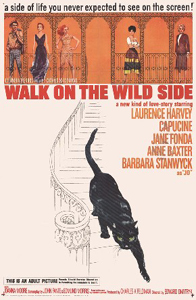Walk On The Wild Side
Walk On The Wild Side is not a very good movie, but it's interesting in context. Released in 1962, it was tawdry for its time period, frankly showing prostitution and even mentioning statutory rape. For that reason it wasn't well received, Today, of course, a film based on Nelson Algren's novel of the same name would be far more explicit.
The movie begins with a Saul Bass title sequence that shows a black cat slinking through some construction pipes and then battling a white cat. We then meet Dove Linkhorn (Laurence Harvey), who is on his way to New Orleans to find his lost love. He meets up with a vagrant, Jane Fonda (in only her second movie). They travel together, and she wants him, but he's devoted to his girl.
When Fonda steals some items from a cafe they visit, Harvey is done with her and returns the stolen goods. The owner, Anne Baxter, is also in love with him, and gives him a job.
Meanwhile, we learn that Harvey's girl (Capucine) is working in a bordello in New Orleans, run with ruthless authority by Barbara Stanwyck. When Harvey finds her he doesn't realize her occupation (which is hard to believe) and plans to marry her. He finds out what she does, but decided to forgive her, by Stanwyck and her henchmen aren't going to let her leave.
Walk On The Wild Side is not a feel-good film. It certainly doesn't glamorize prostitution, as the women seem to be mostly self-loathing (an exception is Joanna as a simple-minded girl). Stanwyck employs an unsmiling sadist to keep things in order (Richard Rust) and her husband, who has lost his legs, serves as a functionary, as she seems to have cast him out of the marital bed. Stanwyck's career had now entered a phase where, as an older woman, she was frequently cast a tough career woman, and she's really evil here.
The film touches on the Christianity of Harvey, as he knows his Bible (he cites the story of Hosea and Gomer for his reason for forgiving Capucine) and in a telling scene denounces a street preacher who speaks of fire and brimstone (notably, the stolen item he returns to Baxter is her rosary).
I was kept in suspense by the end. I knew somebody was going to die but I guessed wrong. The whole thing is a bit overcooked--like the more vivid of Tennessee Williams' plays--and at times seems to be spinning its wheels as Capucine decides whether she wants to leave with Harvey or stay. It's more interesting then entertaining. It was directed by Edward Dmytryk, who had been blacklisted, with some Southern Gothic flair, and is well photographed by Joseph McDonald.
The movie begins with a Saul Bass title sequence that shows a black cat slinking through some construction pipes and then battling a white cat. We then meet Dove Linkhorn (Laurence Harvey), who is on his way to New Orleans to find his lost love. He meets up with a vagrant, Jane Fonda (in only her second movie). They travel together, and she wants him, but he's devoted to his girl.
When Fonda steals some items from a cafe they visit, Harvey is done with her and returns the stolen goods. The owner, Anne Baxter, is also in love with him, and gives him a job.
Meanwhile, we learn that Harvey's girl (Capucine) is working in a bordello in New Orleans, run with ruthless authority by Barbara Stanwyck. When Harvey finds her he doesn't realize her occupation (which is hard to believe) and plans to marry her. He finds out what she does, but decided to forgive her, by Stanwyck and her henchmen aren't going to let her leave.
Walk On The Wild Side is not a feel-good film. It certainly doesn't glamorize prostitution, as the women seem to be mostly self-loathing (an exception is Joanna as a simple-minded girl). Stanwyck employs an unsmiling sadist to keep things in order (Richard Rust) and her husband, who has lost his legs, serves as a functionary, as she seems to have cast him out of the marital bed. Stanwyck's career had now entered a phase where, as an older woman, she was frequently cast a tough career woman, and she's really evil here.
The film touches on the Christianity of Harvey, as he knows his Bible (he cites the story of Hosea and Gomer for his reason for forgiving Capucine) and in a telling scene denounces a street preacher who speaks of fire and brimstone (notably, the stolen item he returns to Baxter is her rosary).
I was kept in suspense by the end. I knew somebody was going to die but I guessed wrong. The whole thing is a bit overcooked--like the more vivid of Tennessee Williams' plays--and at times seems to be spinning its wheels as Capucine decides whether she wants to leave with Harvey or stay. It's more interesting then entertaining. It was directed by Edward Dmytryk, who had been blacklisted, with some Southern Gothic flair, and is well photographed by Joseph McDonald.



Comments
Post a Comment